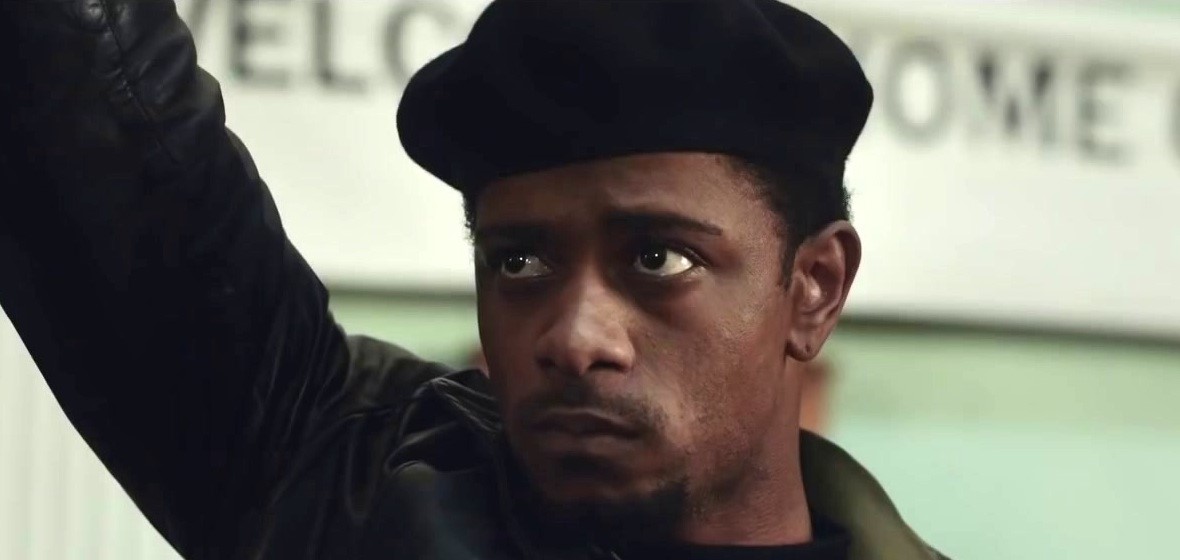Rating: ****
The biopic is the most American film genre that other cinema cultures can only try to copy. It comes from the unique tradition of almost messianic reverence for their subjects, even when they are objectively controversial.
They tend to be sterile and safe, removing the most damning and controversial aspects of the protagonist’s life and reduce it to just three moments – the birth of the hero, usually from a traumatic event; the struggle, when his philosophy is developed, against the will of the antagonist (usually the government); and finally the sacrifice, when his altruistic all-American spirit lives on through all of us. There is no subtlety, no space for nuance. Suddenly characters from our collective history that had the potential to be layered and complex, receive the same treatment as they would in a history class.
Shaka King’s Judas and the Black Messiah ever so slightly twists the genre around by adding one small difference – the subject in question, Black Panther leader Fred Hampton (played by Daniel Kaluuya), is not at the centre of the narrative, and instead of seeing the events through his eyes, it’s someone else’s point of view looking at Fred Hampton.
It’s ingenious, really. King gets to have his own cake and eat it too, and we get to see a film that perfectly represents why Hampton was such a charismatic leader.
The frame is set around the Judas in the title, Bill O’Neal (Lakeith Stanfield), a small-time crook in Chicago who gets recruited by an FBI agent (Jesse Plemons), at the request of J. Edgar himself (Martin Sheen) to infiltrate the local Black Panther Party chapter and feed the Bureau tips on its leader. O’Neal quickly climbs through the ranks until he becomes Hampton’s private chauffeur and, later, his number two. Never his confidant though, which is perfect to keep a distance from our subject. The only times we see Hampton detached from his political purpose, is when he awkwardly courts Judy Harmon (Dominique Thorne) and in a quiet candid moment with the mother of a Black Panther who had recently been shot by the police. The rest of the film is for Kaluuya to shine and give us not just a pantomime of Hampton’s mannerisms, but a carbon copy of his electrifying persona.
Kaluuya is more physical than expected in his role. He has this little slouch when standing that makes him both threatening and approachable at the same time, but even when he has nothing to say, your eyes dart around the screen to look for him. The man is acting with his whole body, eyes and beard included. And in the process, he reveals small insecurities and cracks in the character that the rest of the film doesn’t have to focus on.
King took the assignment with the seriousness it deserves, and it works because he believes in what he’s saying. Letting Hampton preach his rhetoric is the normal step, but what is surprising is he never once questions him or his beliefs. Hampton wasn’t Martin Luther King and he wasn’t Malcolm X.
He didn’t actively look for the stage-light, didn’t want to talk his way out of the civil rights movement, and he didn’t look academic. He was a socialist who advocated revenge against the police who killed African Americans, wore the black beret of his party and quoted Che, Marx and Lenin at all times: the exact opposite of the all-American hero. “You don’t fight capitalism with black capitalism, you fight capitalism with socialism”, he said.
Hampton managed to unite his Black Panther Party with a local group of disenfranchised white workers (sporting a Confederate flag, no less) and a rival group of Puerto Ricans. His struggle wasn’t for the empowerment of the African Americans, as much as it was for the toppling of the patriarchy that enslaved it.
King revels in this. He takes every opportunity to pass on the message without challenging it. Hampton and O’Neal live in small and derelict units. They wear pretty much the same thing and we rarely see them even eat: just how focused they are in their political fight. Plemon’s FBI agent, on the other hand, lives in a beautiful suburban house with a cabinet filled with scotch, he smokes cigars, is always wearing a new vest and normally meets O’Neal over a plate of steak in an elegant restaurant. The visual contrast is so stark it couldn’t be more black and white.
In a way Judas and the Black Messiah reminded me of Warren Beatty’s masterpiece Reds, a terrific film about, in the words of Beatty himself, “a communist man who died”.
Judas doesn’t have the romanticism and grandeur of Beatty’s film, but both pictures are unapologetically dedicated to using the biopic against the political tool it was built for. For the re-release of Reds Beatty said that curiously a film like that could not be financed today, though audiences would be more receptive to it. And though I can see his point: Judas and the Black Messiah is a start.




